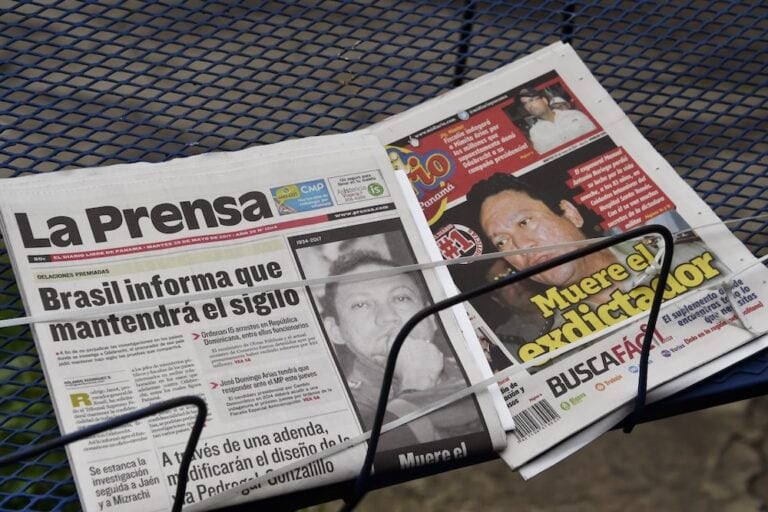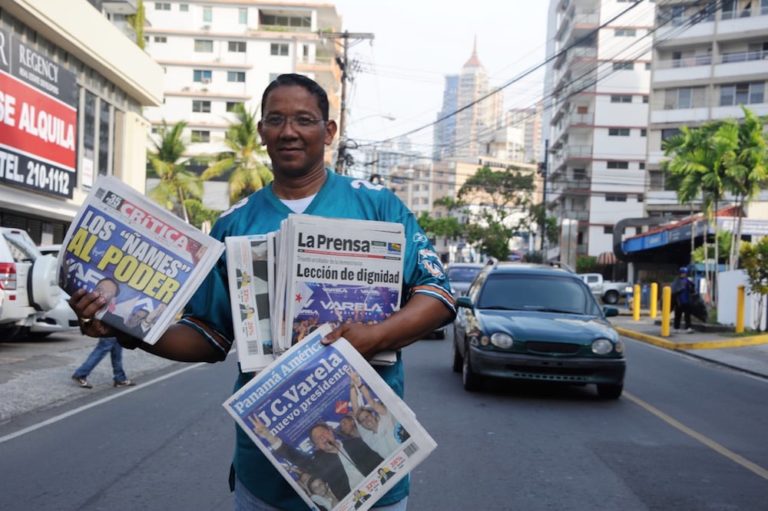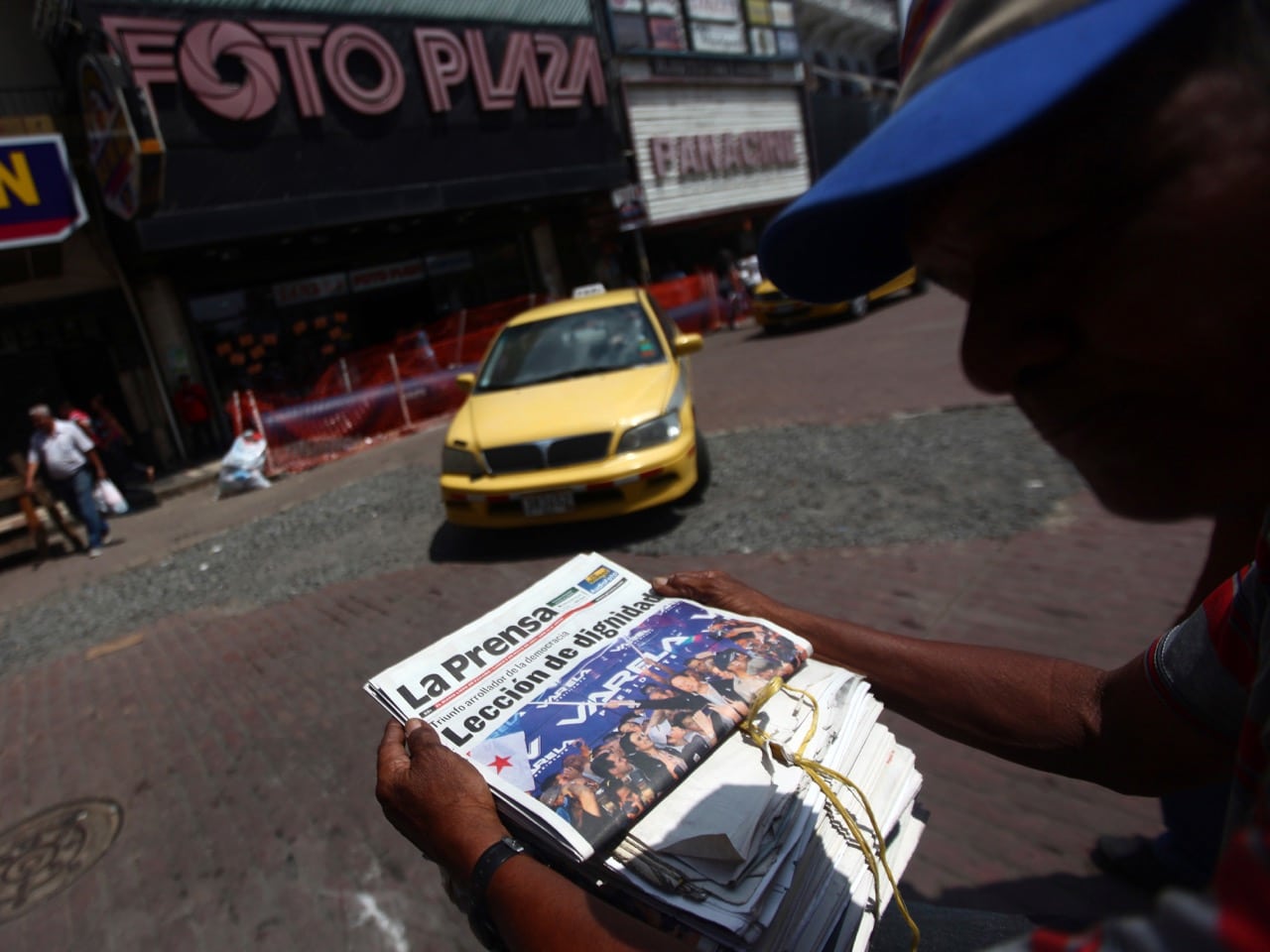(RSF/IFEX) – In a letter to President Mireya Moscoso, RSF protested the adoption of Law 38, which restricts access to public information, and the jailing of Carlos Singares, editor of “El Siglo” daily. The organisation admitted being surprised by this measure, “given that [the president had] committed to reforming Panamanian law, by eliminating provisions that […]
(RSF/IFEX) – In a letter to President Mireya Moscoso, RSF protested the adoption of Law 38, which restricts access to public information, and the jailing of Carlos Singares, editor of “El Siglo” daily. The organisation admitted being surprised by this measure, “given that [the president had] committed to reforming Panamanian law, by eliminating provisions that attack press freedom”. “We ask you to implement this reform programme as soon as possible and, as a provisional measure, suspend the application of Law 38,” Robert Ménard, RSF’s secretary-general, stated.
According to information obtained by RSF, Law 38, regulating norms applicable to officials such as the attorney general, was passed by Moscoso on 31 July 2000. Article 70 of the law regulates access to public information, and stipulates that “information which may be confidential or restricted for reasons of public or special interest, cannot be distributed, as doing so could cause serious harm to society, the State, or the individual in question”. According to the document, this could apply to information related to “national security, someone’s health, political opinions, legal status, sexual orientation, criminal records, bank accounts and other such data which are of a legal nature”. On 12 July, Santiago Canton, the Organization of American States’ Special Rapporteur for Freedom of Expression, recommended that Panamanian authorities “promulgate laws which will guarantee the right to access to information.”
Furthermore, on 28 July, Singares was jailed in the Tinajitas prison, about twenty-five kilometres north-east of the capital. Three days prior to his imprisonment, the Supreme Court upheld the legality of a sentence of eight days in prison, ordered by Attorney General José Antonio Sossa on 22 June. The attorney general accused Singares of publishing information which allegedly offended “[his] dignity, honour and position”. The daily had published an article written by a lawyer, in which the attorney general was accused of frequenting “meeting places … in search of pleasure with underage adolescents”.
In Panama, the crimes of “contempt” and
“defamation” of officials are punishable with prison terms, subject to regulations, some of which were promulgated under dictatorships and are known as “gag laws”. Sossa’s decision was in accordance with Article 386 of the Legal Code which authorises the attorney general to pass prison sentences of up to eight days, for “attacks against [his] honour”. This regulation is based on Article 33 of the Panamanian Constitution, which stipulates that “public servants who exercise authority and jurisdiction, … can pass sentences without due process, according to the law, and impose fines or orders of arrest against anyone who insults them or shows disrespect for them or the authority of their position”. On 14 July, this law was used to sentence Jean Marcel Cherry, of “El Panamá América” daily, to eighteen months in prison or a fine of US$1,800. According to Ombudsman Italo Antinori, currently there are at least forty pending cases of journalists accused of “defamation”.
RSF reminded President Moscoso of her 20 December 1999 statements, when she referred to these laws as “Damocles’ sword”, at the same time as she insisted that in Panama “there are no laws or actions that restrict press freedom.” On 30 November 1999, a first step towards making this a reality was taken, when the Panamanian parliament approved a law repealing Laws 11 and 68, which provided for the closure of newspapers and the imposition of substantial fines for press crimes.
RSF further noted that international institutions working for press freedom have unanimously spoken out against prison sentences for press crimes and have called for the reform of Panamanian legislation. In January 2000, the United Nations special rapporteur for the promotion and protection of the right to freedom of opinion and expression urged “all governments to see to it .. that press crimes were not subject to prison sentences, barring those which refer to racist or discriminatory comments, or which incite violence,” because “a prison sentence as punishment for the peaceful expression of an opinion is a serious human rights violation.” On 12 July, Canton asked the Panamanian government to decriminalise acts of defamation against officials and eliminate all “contempt laws” which allow journalists to be jailed without a trial.


